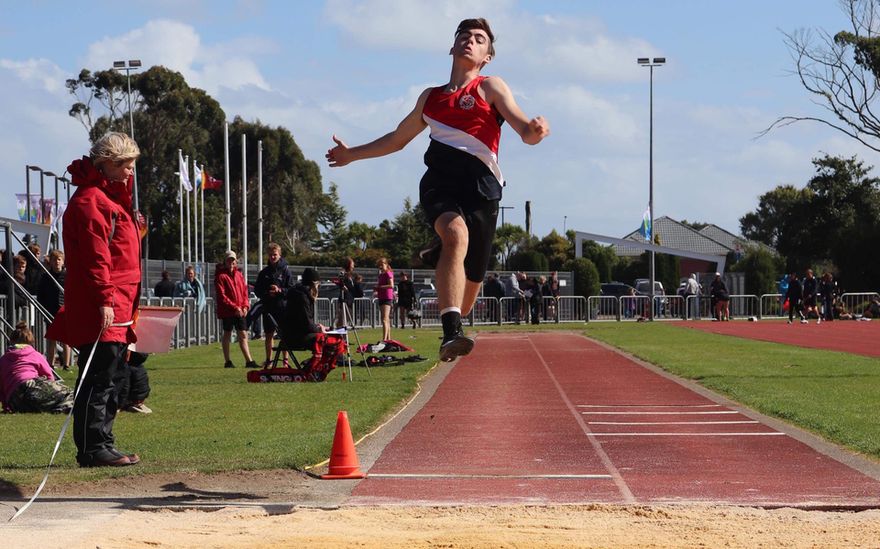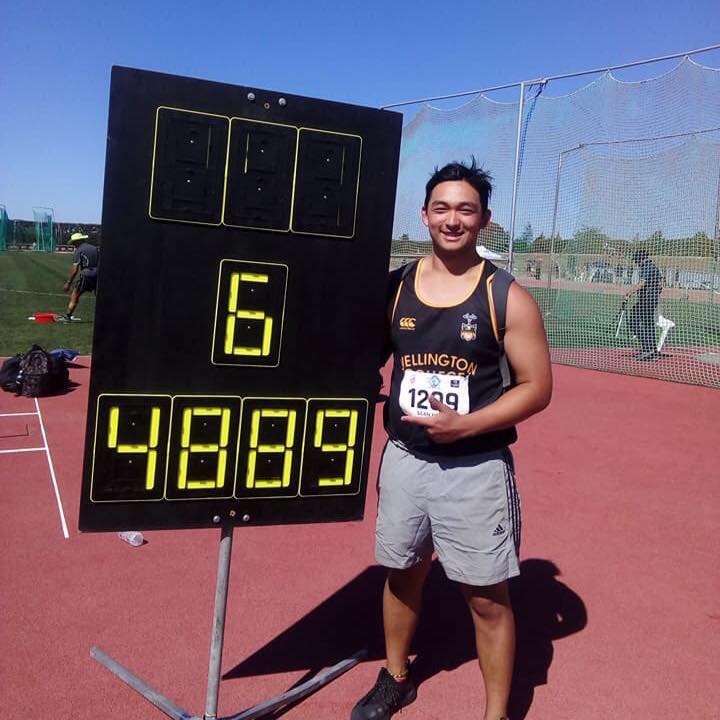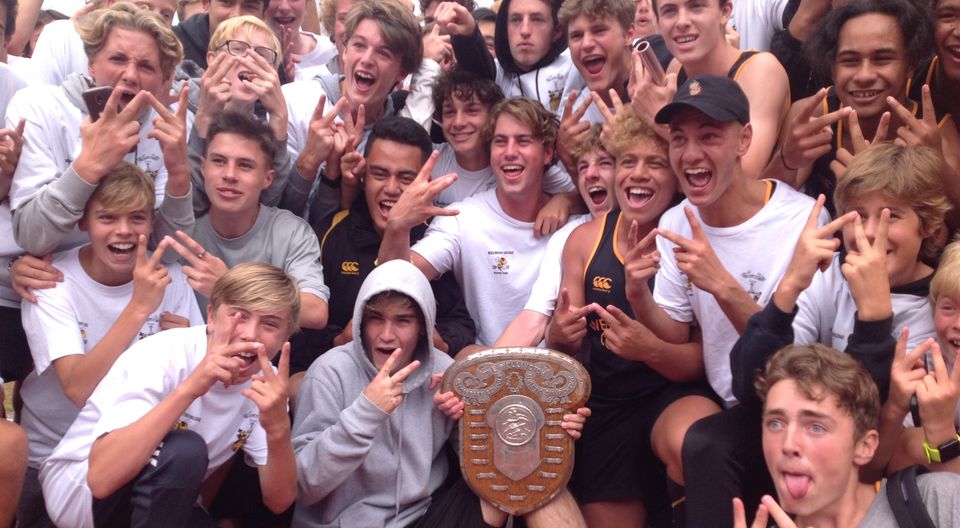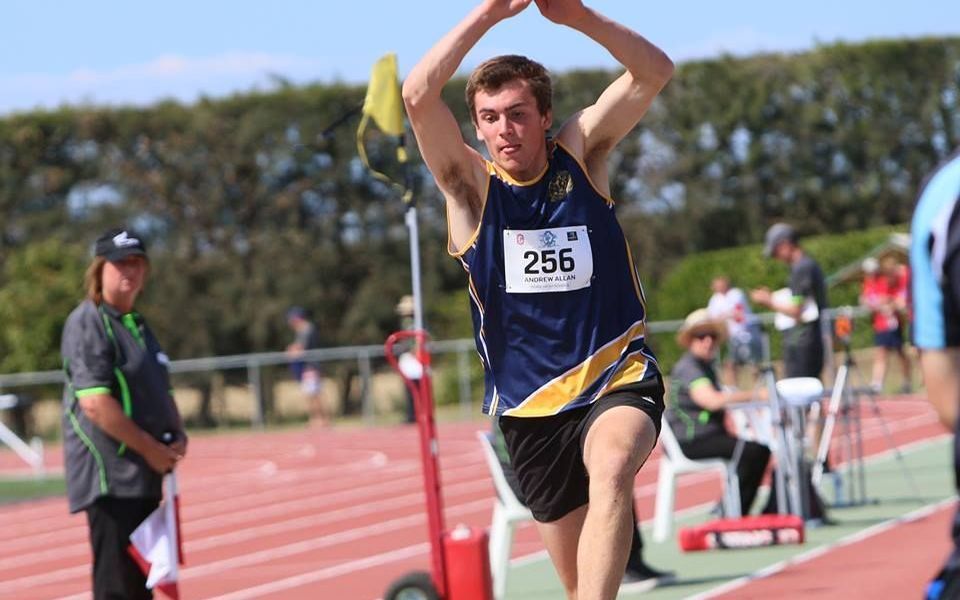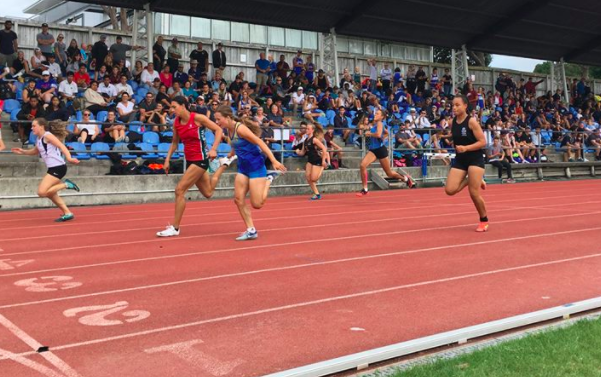 The Auckland Secondary Schools Athletics Championships were held yesterday at Mount Smart Stadium. In an earnest build up to the North Island Secondary School Championships on April 6 in Wanganui there were many fine performances. Connor Bell from Westlake Boys’ High School won the senior discus title by a dozen metres, throwing a record 62.33m. Bell was a gold medalist at the Junior Commonwealth Games in 2017 and should feature at the Junior Olympics in Argentina in October. Dom Overend from Auckland Grammar School continued his top form in the intermediate age group. He won the 100m comfortably in 10.84s and returned to the 200m, winning that event as well as being a member of the record breaking 4x100m relay team. Oliver Parkinson, also from Auckland Grammar School, set a new Boys Open 300m hurdles record, winning in 39.09. Jamie Robertson from King’s College won the Intermediate 400m in 51.78, and then backed up with a tight win over Matthew Eady from Selwyn College. Robertson hit the tape in 2.03.31 ahead of Eady in 2.03.81. Avondale College year nine discus thrower Percy Maka threw 52.79 to win his junior event, also winning the junior boys shot put in 13.66m. King’s College’s Zane Powell was impressive in doing the Intermediate 1500m-3000m double. His schoolmate Hayden Dickson threw the Senior Boys javelin 57.75m. Rosmini College’s Jayden Williamson cleared 1.90m in winning the Intermediate high jump. Top seed Liam Wong from Auckland Grammar won the Senior Boys long jump in 6.32m. In the female events Nadia Evans from Long Bay College enjoyed a productive meeting winning the Junior 100m, 200m and long jump. Gabby Hayton from Auckland Dio had fast feet to claiming the Senior 100/200m double. The first three finishing schools across the tape set records in the Girls 4x100m relay. The record of 49.08 was set in 1986 by Auckland Dio, but first placed St Cuthbert’s ran 48.00 flat, ahead of second placed Takapuna Grammar School in 49.02 and Kristin School in 49.90. Charlotte Holland from St Cuthbert’s College was the only female to run under a minute in the Junior 400m and also captured 200m honours. The Intermediate Girls 800m was also a close-run finish, between winner Kimberly May of Green Bay High School in 2.17.39, second placed Frances Good of Waiuku College in 2.17.70 and third placed Peyton Leigh of St Cuthbert’s in 217.95. Gabrielle Leech of Baradene College stopped the clock at 1.02.83 in the Senior Girls 400m, ahead of second placed Emma Leaming of Auckland Dio at 1.02.17. Saint Kentigern College’s Nadia Rankin-Chittar won the Junior Girls shot put and discus events, while her school mate Lisa Putt won the Senior Girls long jump and triple jump. Savannah Scheen of Hobsonville High School captured both the Senior Girls discus throw (winning by 70cm) and the Senior Girls Javelin. She also finished second in the Senior Girls hammer throw. Rosehill College’s Taylor Bell smashed the Senior Girls 2000m race walk record, crossing the finish line in 12.31.89, beating the two-year old record of 14.53.05. Manurewa High School medaled in 10 out of 16 hammer throwing events. For full results click here: http://collegesport.co/wp-content/uploads/2018/03/College-Sport-Auckland-Championships-Results-2018.pdf In the junior triple jump final at the National Secondary Schools Track and Field Championships last December the vibe was so relaxed each of the competitors were joking they would significantly improve their personal bests by a considerable distance. The joke soon became a reality and turned the contest serious. “My personal best before Nationals was 12.70m. I jumped a record 13.58m to win,” eventual champion Sam Colyer from Southland Boys’ High School reflects. “The second placed jumper improved from 12.10m to 13.14m. It was a perfect day and a nice track. Everybody did their best,” he continued. Colyer won the long jump crown at the same event in Hastings and last week annexed the South Island Secondary Schools U16 triple jump and long jump double in Timaru. He could soon be leaping around the world. Next week Colyer leaves for Los Angeles to contest the Arcadia Invitational, a national high school meet, the West Coast Relays and the Bryan Clay Invitational for his club, St Pauls Harrier and Amateur Athletic Club. “I submitted a note of interest and things started to happen. I’m not sure what to expect in the US, but it's about gaining experience and dealing with pressure,” Colyer responds when asked about the purpose of the trip. Earlier in March, Colyer won the National Under-18 long jump and triple jump titles at the National Club Championships in Hamilton. “Conditions were good and the triple jump went according to plan. In the long jump I was struggling until my teammates came over to watch my final jump. They encouraged me to go as hard and as high as I could. I jumped 6.37m which was good enough to win,” Colyer recalls. Colyer has been selected for a compulsory trial at the Oceania Polynesian Games being held in Vanuatu in May. A top-two finish would see him qualify for the Youth Olympics in Argentina in October. “I’m hoping the US will help me prepare for the pressure of Vanuatu. I’ve been jumping well and to go to the Youth Olympics would be a big deal,” Colyer anticipates. Colyer is hoping his back will hold firm. Discomfort from spondylolysis (a vertebrae complaint) has been an ongoing concern. “I was born with it, but it only became obvious a couple of years ago when I started feeling sharp, lower back pains. I originally thought it was a muscle injury and I was getting massage treatment to deal with it. When it wouldn’t go away, I found out it was more serious,” Colyer admits. Colyer engages in a number of exercises prior to competing to ensure his back behaves itself. “I sit on a chair and do twists. I have special stretches which I have researched; you can even hear me clicking in exams. My routine looks a bit strange, but it works for me,” Colyer explains. Colyer started jumping in year six and was such a resounding victor at the primary school athletics day he took up the sport permanently. His family run an electrical business in Invercargill. Colyer is coached by local veteran Lorne Singer. 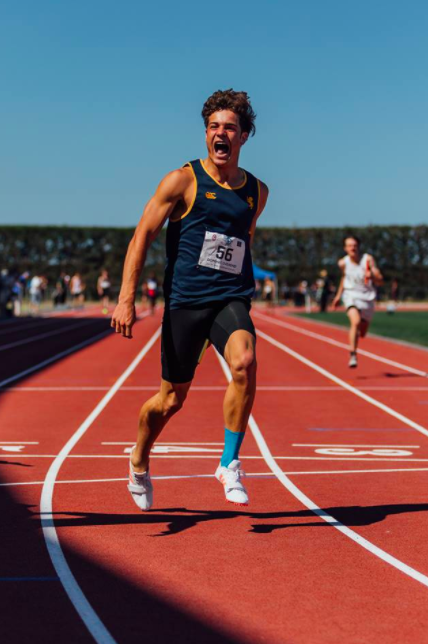 sA MRI scan, a CT investigation, try what he willed, Dominic Overend couldn't resolve the source of an unusual pain. All the Auckland Grammar sprinter knew was something was seriously wrong after a 200m race in Sydney in April last year. “I was competing at the Australian Champs and started the 200m in the lead before something kinda snapped and I was unable to finish,” Overend recalls. “At first I thought I had torn a hamstring or done my Achilles, but when I went to see the doctors they didn’t know what it was either. The pain would come and go,” he continued. Weeks of confusion ensued until the problem was finally diagnosed. “A bit of bone in my right heel had overgrown, which put strain on my foot especially when turning corners. I had surgery and was in a moonboot for two months,” Overend reveals. Negotiating bends in the 200m became troublesome so Overend made a decision to temporarily abort that discipline. Last weekend, Overend returned to the site of his injury to compete in the U20 Australian championships in the 100m, an event by default which has become his exclusive focus. The results have been spectacular. “I ran 10.75 in the heat, which was a good start and consistent with the times I had been running recently. I had run 10.73 at the central west zone championships, but that didn’t count because of the wind which was unlucky,” Overend says. The New Zealand U17 record was broken by Overend in the heats. Dalton Coppins mark of 10.78 set in 2012 was passed. An even better result awaited in the final. “I ran 10.59. The conditions were perfect. It was still and everything clicked,” Overend enthuses. Overend’s time in Sydney ranks him the second fastest sprinter in the country this year behind senior National champion Joseph Miller whose 25. Overend returned from his injury less than a month out from the National Secondary School Championships in December. He ran 10.99 which would have been fast enough to win the Junior title, but come Hastings he was even quicker. “I ran 10.83 at Nationals, which was a record. That was pretty satisfying given my poor build up,” Overend reflects. Due to the hot conditions in Hastings, sprint finals were brought forward two hours. However, Overend was initially unaware of this fact and was only told about it 20 minutes before his final by senior champion Nick Smith of Hutt Valley High School, giving him a rushed preparation time. The North Island Secondary School championships are in Wanganui on April 6, but Overend may pass chasing a bigger target. “The Melanesian Regional Championships are in Vanuatu in May. If I can finish in the top two in my region at that event, I will qualify for the Youth Olympics in Argentina in October,” Overend divulges. Anywhere between 10.60 and 10.85 can be expected to be the qualifying time for the 100m at the Youth Olympics. The 2014 champion, Sydney Siame from Zambia run 10.57. Odean Skeen from Jamaica was quicker four years earlier setting a pace of 10.42 Note: Katrina Robinson was the most impressive female age group performer in Sydney. She cut eight seconds off her previous best 3000m time in finishing second in 9:03.84 to break her own New Zealand under 18 record and establish fresh records for under 19 and under 20 New Zealand records. Her under 18 record was 9:12.18 set in Brisbane in February, and she erased Rosa Flanagan’s under 19 2015 record of 9:07.85 and Sue Bruce’s 1984 under 20 record of 9:05.95. Robinson who also holds the under 17 record now holds all the junior grades 3000m New Zealand records Pain is temporary, pride is forever,” declares Sean Howe when explaining his decision to compete in the McEvedy Shield a fortnight ago.
On the weekend prior to the event, Howe sustained an unfortunate and unusual injury which put his place on the Wellington College team in potential jeopardy. “I was at a youth night at the church of my friend Nathaniel Sulupo, who’s also a good athlete. We were fooling around and I was pushed into a wall and landed badly on my toe. The injury required a crutch,” Howe explains. What did Howe say when he had to confront his coaches with news of the injury? An experienced and cynical school teacher might struggle to find injuries at church a plausible explanation. “That wasn’t easy, but I told them the truth and they trust me so they had to accept it,” Howe recalls. In 2015, Howe threw a shot put and discus for the first time and found the pursuit instantly appealing. A year later, Howe was good enough to finish fifth at the North Island Secondary School Championships. Further success followed at the 2017 McEvedy Shield when Howe won the discus, but peak-form was struck at the National Secondary School Championships in Hastings in December, 2017. Howe threw two PB’s in winning a silver medal in the shot put and a bronze in the discus. Howe was the only left hander in each of the finals. “I was real pleased with my results at Nationals. The competition was pretty stiff, but I worked hard and competing at that level felt great,” Howe enthuses. Howe’s initial efforts in the shot put at the 2018 McEvedy Shield weren’t great, but he soon warmed to his work. “Nothing was going to stop me competing. It’s my last McEvedy and I love it. My first few throws were a bit painful, but with my fourth throw I set a PB of 15.67m which was good enough to win,” Howe recalls. Howe also won the senior discus at McEvedy, an event he finished second in at the National Club Championships, throwing a PB of 50.42m. The emotion of winning McEvedy under personal duress proved a little overwhelming for Howe. A video of him leading a celebratory haka with his crutch emulating the actions of a swinging taiaha caused a bit of a stir. “The response has been pretty mixed, but I guess most people have seen it as pretty humorous or spirited,” Howe reflects. “I’m Maori and have being doing Kapa Haka for nine years so I’m pretty immersed in the culture. It was just one of those things that happened. Our team was waiting for someone to step up and lead the haka. When nobody did, I thought who else would be better than me,” Howe continued. What did the Maori teacher say? “He didn’t say anything, he didn’t have to,” Howe laughs. Howe is coached by former Samoan Olympian Shaka Sola who runs an Academy in the capital. Howe will compete at the North Island champions in Wanganui on April 6. The next major goal for the chirpy southpaw is to earn selection for the New Zealand team who will compete at the Oceania Championships in Samoa in October. 9/3/2018 Lynching the McEvedy Shield"This one's the best because I'm captain and it's my last," responds Dylan Lynch when asked which one of his four McEvedy Shield triumphs is his personal favourite.
Wellington College won the 95th annual McEvedy Shield at Newtown Park on Tuesday defeating St Patrick’s College, Wellington by 38 points. It's a victory with origins as far back as December 2017. “After Nationals we had a short break before we started holiday training. Five days a week we trained and 80 percent of the team turned up every time, which was awesome," Lynch explains. Lynch broke the U14 3000m record in 2014 and has attended every single team practice since Year 9. This dedication Lynch believes earned him the appointment as team skipper. "I guess the coaches saw me as a figure the juniors could look up to. The seniors try to lead by example with our actions," he says. "I gave the boys a bit of a pump up on the day, reminding them to represent the college with pride and leave everything out there," Lynch continued. Wellington won nine medals at the Nationals Secondary Schools Track and Field Championships last year in Hastings, their best effort in the last decade. Wellington is served by a quartet of quality mentors. “Mr Tinkle is the administrator of athletics and sprints and high jump coach. He is a young guy who brings a lot of energy. Mr Paul is the distance coach and has been for 20 years. He knows a lot and really drives us hard. Mr Rawles specialises in the javelin. He went to St Pat’s Town and was a runner. He loves it. Mr Wells coaches jumping and throws. It’s a great team,” Lynch acclaims. Lynch identified the performances of Cameron Robinson, Hartley Patel-Muxlow and Matthew Markham as particularly outstanding. Robinson threw a record 65.50m in winning the open javelin. Sutcliffe led from start to finish in a commanding 1500m win while Patel-Muxlow broke the U15 triple jump record as well as claiming first in the hurdles and 4x100m relay. Lynch himself was a winner on the day, claiming the open 3000m. "It felt pretty good. I knew I had superior speed at the end so I sat in the pack and let it go at the right time,” he recalls. Lynch is from Brooklyn and is working towards attaining a scholarship in the USA in 2019. The College Sport Wellington Athletics finals are next Thursday at Newtown Park. “My first three jumps were pretty crap. I was flustered and needed some inspiration,” Andrew Allen complains when reflecting on a crucial juncture in the triple jump final at the National Secondary Schools Track and Field Championships last December.
Allan’s coach Lance Smith was absent due to health reasons and was sought urgently on the phone. “I rang Lance and he calmed me down a bit. He told me to relax and just go for it,” Allan recalls. Allan leapt a personal best 13.97m, an effort he has not bettered, and captured the open gold medal. What would have happened if Lance hadn’t picked up? “I don’t know, but I don’t think it would have turned out as good,” Allan responds. Sixteen years ago Lance Smith shifted from Auckland to Invercargill and started his athletics involvement in Southland as a volunteer coach. Smith now boasts over a dozen athletes in his stable who achieve to a high level nationally. How did Allan and Smith first meet? “I was 14 years old and won a competition in Invercargill. Lance approached me and offered his support. I liked him straight away,” Allan reflects. Three times a week, Allan travels 45 minutes from Gore to Invercargill to train with Smith. It’s proved to be a fruitful relationship. In 2015, Allan won his first gold medal in triple jump at the National Secondary Schools Championships. What is it about Smith’s approach that resonates strongly with Allan? “Lance not only takes an interest in your athletics, but your personal life. I like to think about things and Lance is good at providing me things to think about that I can use to improve my jumping,” Allan acclaims. In the past 12 months Allan’s thoughts have extended well beyond Southland. In April last year Allan travelled to Los Angeles to compete for three weeks. A US collegiate scholarship is an ambition. “It was great to be exposed to tougher competition. Everything was so hyped up and bigger over there. I learnt a lot, but didn’t enjoy most Americans thinking I was an Australian,” Allan laughs. In June, Allan won the Under-18 triple jump title at the Oceania Games in Fiji as well as capturing a bronze medal in the senior event and 4x100m relay. In a fortnight Allan will travel to Australia for the first time to compete in the Australian Junior Championships in Sydney. “Australia will be a big step up, but I have been looking forward to it for a long time and I’m confident of achieving a good result,” Allan enthuses. Allan plans to play hockey in the winter while “training the house down” for the defence of his National Schools title in Dunedin in December. Unfortunately the Youth Olympics in Argentina in October are unattainable. Allan’s parents run a dairy farm. Andrew is the middle of three siblings with a younger and older sister. His older sister Ann Marie has commenced a physiotherapy degree at Otago University this year. P.S. Smith has coached 19 athletes to National honours. Jack Beaumont, Atipa Mabonga, Greer Alsop, Hannah Miller and Allan are among those to have medalled in international competitions. In 2012, Smith was named Southland coach of the year. |
Archives
October 2023
|
OrganisationCollege Sport Media is dedicated to telling the story of successful young sportspeople in New Zealand
|


